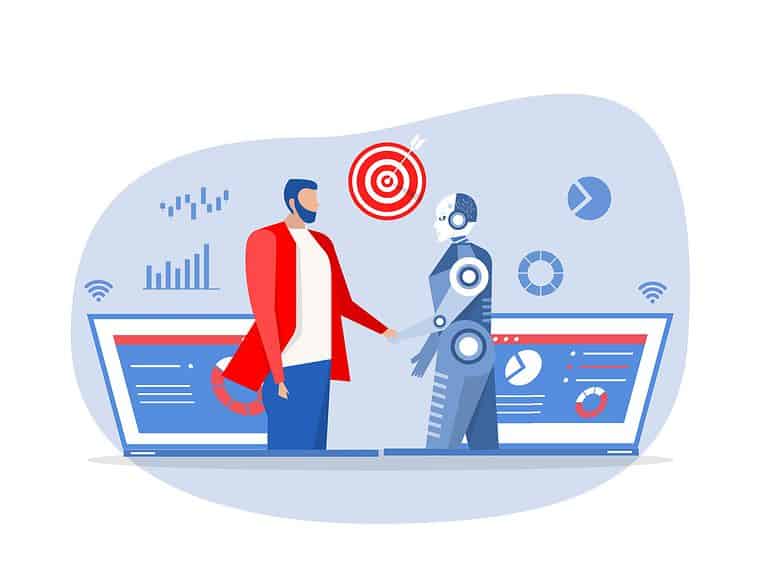Maximizing Efficiency: How to Use AI in Business for Competitive Advantage
Are you ready to capitalize on artificial intelligence but unsure where to start? Implementing “how to use AI in business” goes beyond mere buzz—it’s a strategic move that can redefine your efficiency, decision-making, and customer relationships. This article delves into concrete ways to utilize AI in your business to stay competitive without diving too deep into the methodologies that we’ll explore later. Learn to leverage AI across multiple domains, from customer service to cybersecurity, without excesses and sales jargon.
Key Takeaways
AI is revolutionizing customer service with tools such as chatbots, virtual assistants, and NLP, providing round-the-clock support and personalization, leading to enhanced customer interactions.
AI automation is streamlining business processes by handling repetitive tasks like data entry and inventory management, thereby increasing efficiency and reducing human error.
AI empowers businesses to make data-driven decisions, with capabilities like analyzing customer behavior, recognizing market trends, and identifying new opportunities, to stay competitive.
Leveraging AI for Enhanced Customer Service

The introduction of artificial intelligence has greatly altered the customer service arena. The most recent communication you had with a customer service rep can now be made much easier, faster and tailored to your needs thanks to AI. This technology brings chatbots, virtual agents and natural language processing together for smoother interactions between customers and reps alike.
AI is helping take customer experiences from average to extraordinary by utilizing these tools such as voice recognition software which are backed up by natural language understanding processes aiding both clients’ issues resolution along with their overall satisfaction levels when in contact with representatives online or over the phone lines.
Chatbots and Virtual Assistants
AI tools such as Ultimate, Zendesk bots, Netomi and Freddy AI are ushering in a new era of customer interactions through their generative capabilities. Customer requests can be quickly handled with the help of these chatbots and personalized marketing campaigns have become more efficient than ever before. A few examples which demonstrate how AI is being used to improve communication between customers include faster response times for queries due to round-the-clock support from virtual assistants along with enhanced personalization all powered by Generative AI technology. These solutions collectively represent an upgrade that bridges the gap between businesses’ goals and consumers needs when it comes to interacting effectively on any channel or platform.
Natural Language Processing for Personalization
NLP, otherwise known as Natural Language Processing, is a vital contributor to the current AI uprising. By permitting Artificial Intelligence systems to understand and properly handle customer queries efficiently, it’s making sure that conversations are tailored according to each customer’s individual demands. Create an experience similar to having one’s own private assistant that can help you get through your journey with ease.
From interactive chatbots to intelligent virtual agents, NLP has had quite an impact on improving customer service altogether!
Streamlining Business Processes with AI Automation

AI automation is revolutionizing the way businesses are run, allowing for tasks like data entry and inventory management to be automated by AI tools while freeing up human resources to focus on more creative and strategic work. This sort of efficiency allows manual processes, such as those in supply chain operations, to become much easier since there’s no longer an element of human error present. Thanks to this advanced AI technology companies can rest assured that their business processes will remain streamlined with minimal effort needed from staff members.
Inventory Management
The use of AI is transforming inventory management, with intelligent algorithms examining past and present data to gauge future demand. This helps ensure that the right amount of stock is available at all times, meaning no more shortages or excess supply! As a result, there’s an optimized balance in meeting customer needs while minimizing wasted resources.
Data Entry and Process Automation
Moving onto data entry, AI is revolutionizing the historically tedious process. Through AI-driven tools such as Docsumo, UiPath and Google Docs, AI automated data input helps to lessen redundant tasks for employees while allowing them to focus on more important matters. This means that due to Artificial Intelligence technology, entering information no longer has to be a strenuous task but an optimised procedure that promotes better results within businesses overall operations.
Harnessing AI for Data-Driven Decision Making

AI is more than a tool to optimize efficiency, it’s also instrumental in helping businesses make informed decisions. By studying customer behavior and recognizing various market trends, AI provides vital insights for companies to remain competitive, be that anticipating customer churn or observing employee turnover patterns.
Analyzing Customer Behavior
Analyzing customer behavior is an essential factor for any marketing strategy that hopes to succeed. With AI, this can be achieved through the utilization of machine learning algorithms, allowing businesses to gain insight from data on customers and implement informed strategies. Through such technology one can identify trends, segment audiences into relevant groups and personalize messaging in order to optimize campaigns accordingly with a view to increase customer engagement. This effectively enables organizations to create tailored approaches so as not only reach their target audience but also improve user experiences too!
Market Trends and Future Opportunities
AI can create value for businesses by helping them make strategic decisions related to resource allocation, spotting new market prospects, anticipating consumer habits and optimizing pricing structures. With this assistance from AI applications in the form of cognitive functions, it is possible for organizations to stay ahead of developments as they come up and ensure their business functions adjust accordingly so that they can remain successful. Through carefully identifying shifts in the market trends, enterprises are able to take advantage of opportunities presented while keeping pace with current events, allowing overall growth potentials maximum reach.
AI in Marketing and Sales: Boosting Performance

AI is greatly impacting marketing and sales strategies by examining data points to improve operational efficacy. From enhancing customer relationship management (CRM) approaches to optimizing advertising campaigns – AI has become a staple tool for the modern marketer’s arsenal.
Campaign Optimization
The utilization of AI technology in optimizing campaigns has drastically changed the game. Through careful consideration and analysis of customer data, it allows for crafting customized marketing strategies with higher levels of engagement leading to increased returns on investments (ROI).
Salesforce, HubSpot, Adobe Marketo Engage are some popular applications that make use of this powerful tool effectively. By having a deep understanding of preferences from consumer information collected through such software solutions organizations can create successful promotional tactics tailored precisely for their target market.
Customer Relationship Management (CRM)
Using AI in their CRM systems, businesses are gaining a competitive advantage with strengthened customer relationships. By providing tailored attention and relevant suggestions, these enhanced platforms boost satisfaction and loyalty – leading to more powerful connections that reward customers and companies alike.
Implementing AI in Human Resources

HR is a field that AI is having an immense impact on. By optimizing recruitment and onboarding of human personnel, as well as enhancing worker commitment and productivity, artificial intelligence brings about more proficient HR administration with the potential to attract high-level talent. Human Resources are thus enabled to carry out their roles in a streamlined way, which makes it easier for them to keep top performers within the organization.
Recruitment and Onboarding
AI is transforming recruitment and onboarding processes with automated solutions, such as Beamery, Humanly, or Pomato. These AI tools are reducing time-to-hire and enhancing talent acquisition by streamlining candidate sourcing and screening, just a few examples of how the technology is revolutionizing the field.
Employee Engagement and Performance Management
AI-driven performance management tools are proving highly beneficial in terms of employee engagement and productivity. Such as improved motivation, satisfaction levels, retention rates, all leading to greater business success. Real-time feedback and coaching generated by AI is encouraging growth and creating an even more fulfilling working environment for employees.
Safeguarding Businesses with AI in Cybersecurity
As a powerful ally, Artificial Intelligence (AI) can help protect businesses from cyber threats. AI is instrumental in bettering detection and response to these types of security issues as well as introducing measures that reduce the risk overall. This results in an environment where companies and their patrons feel confident they are secure against possible hazards online. The integration of AI into cybersecurity provides peace of mind for all involved parties, customers and business owners alike!
Threat Detection and Response
AI is an invaluable asset when it comes to guarding against digital security threats. It offers quick detection and response times, thereby limiting damage or disruption of operations for businesses. Meaning they can stay focused on their core activities with peace of mind knowing that measures have been put in place to protect them.
Preventative Measures
To protect businesses from cyber threats, AI-enabled preventive measures are the way to go. It is more beneficial than having a curative approach and this allows organizations to stay one step ahead of potential harm that could be caused by digital vulnerabilities. Proactive strategies like these can give firms an edge in terms of keeping their data secure.
Legal and Ethical Considerations of AI in Business
When implementing AI, businesses must consider numerous legal and ethical issues such as data privacy, security risks, potential job displacement caused by automation and any prejudicial biases within algorithms. All these should be addressed to reap the full benefits of artificial intelligence.
Data Privacy and Security
It is critical for businesses to ensure data privacy and security when taking advantage of AI. This entails adhering to regulations, protecting confidential information, utilizing methods like anonymizing data sets, having human control over the decisions made by AI algorithms, as well as establishing strong governance policies regarding how the organization’s personal or sensitive customer/employee-related info should be handled. All these steps can help guarantee safe use of artificial intelligence in a business setting.
Workforce Displacement and Algorithmic Bias
To guarantee ethical AI integration, organizations must tackle employee displacement and algorithmic prejudice. They should allocate funds towards educational programs as well as creating solutions that shield workers from the negative impacts of AI to reduce workforce expulsion. They can also ensure just and precise AI systems through extensive testing processes combined with equitable practices.
Summary
In this digital age, businesses that use AI can gain an advantage over their competition. Its uses are numerous and include providing better customer service, streamlining business processes, and making data-driven decisions for marketing and sales performance optimization. Enhancing HR activity as well as protecting against cyber threats. While it is important to reap the benefits of artificial intelligence technology responsibly by being aware of possible legal or ethical implications during implementation, AI presents a wealth of opportunities when used correctly in any industry.
Frequently Asked Questions
How could AI be used in business?
AI has become a powerful and vital tool for modern business operations, aiding in various important processes such as targeted marketing campaigns, streamlined supply chains and optimized pricing models. AI technology helps to gain useful insights from data analysis, engage with customers/employees more effectively by understanding individual needs better through segmentation & personalization tools based on customer perceptions gathered by the system. Finally, it also assists in finding potential opportunities for improvement within any organization or project respectively.
How does AI enhance customer service?
By implementing artificial intelligence, customers can enjoy a personalized experience and get swift responses. Through the utilization of chatbots, virtual assistants and natural language processing technology, customer service is enhanced significantly, which results in greater satisfaction as well as increased efficiency.
What are the legal and ethical considerations of implementing AI in business?
When integrating AI into business operations, it is essential to assess potential legal and ethical repercussions – such as data privacy issues, the displacement of employees or algorithmic discrimination. To effectively manage these considerations, proactive steps must be taken. Thorough assessment should not be overlooked.







